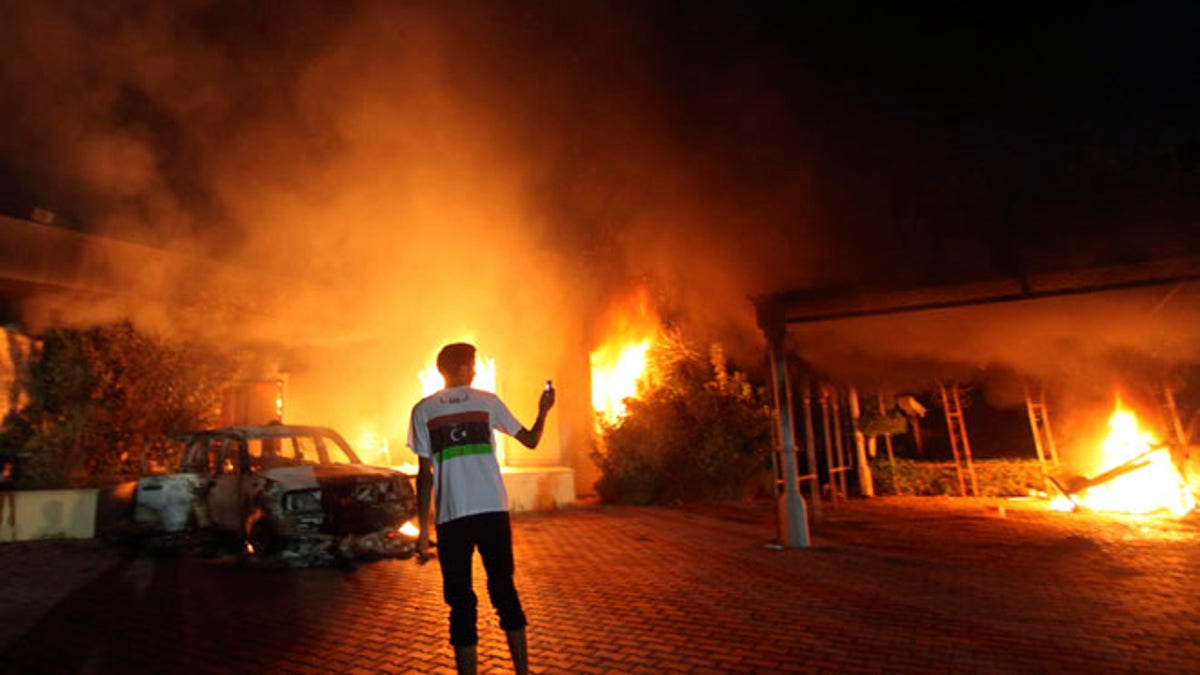
The U.S. Consulate in Benghazi is seen in flames on September 11, 2012. (Reuters)
An indictment Tuesday of a Libyan militant already behind bars for the 2012 Benghazi attack that killed four Americans confirms that computers with sensitive and classified information were stolen from the consulate during the assault.
Fox News was first to report in July that at least two computers were stolen from the consulate. While the State Department initially dismissed Fox's report, the new, 18-count indictment against Ahmed Abu Khattala confirms that sensitive and classified information was lost, including the location of the top secret CIA annex.
Abu Khattala, 43, the first militant to be prosecuted for the Benghazi violence, had initially been charged with conspiracy to provide support to terrorists, resulting in death. U.S. officials had described that initial, one-count indictment as a placeholder to allow for him to be brought into court and for a grand jury to hear more evidence.
The new indictment does not add to the public account of how the attack unfolded but it does include multiple counts that make Abu Khattala eligible for the death penalty if convicted, including murder of an internationally protected person and killing a person during an armed attack on a federal facility. It also accuses him, among other charges, of providing material support to terrorists, malicious destruction of property and attempted murder of an officer and employee of the U.S.
The indictment also alleges rocket propelled grenades, AK 47s and semi-automatic assault rifles were used at the consulate, and then mortars at the Annex during the third wave of the assault – a level of firepower that would contradict the administration's initial explanation that a demonstration had simply turned violent.
After his capture during a nighttime raid, Abu Khattala was brought to the U.S. aboard a Navy boat where he was interrogated by federal agents. He remains in custody at a detention facility in Alexandria, Virginia.
One of his public defenders, Michelle Peterson, said last summer that prosecutors had not presented evidence tying him to the attacks. On Tuesday evening, she declined to comment about the indictment because she had not seen it.
Federal prosecutors have long accused Abu Khattala of being a ringleader of the Sept. 11, 2012, attacks that killed Ambassador Chris Stevens and three other Americans. Attorney General Eric Holder said the new indictment reflects Abu Khattala's "integral role" in the attacks.
But the new superseding indictment against Abu Khatallah does not suggest that he was the mastermind of the plot, but rather that he carried out the plan – he always has been described to Fox as the "muscle on the ground."
The superseding indictment alleges that Abu Khattala was involved in the two different attacks, hours apart, on the diplomatic compound. The violence was aimed at killing American personnel at the compound and looting the buildings of documents, maps and computers, the Justice Department says.
In the first burst of violence on the night of Sept. 11, prosecutors allege, Abu Khattala drove to the diplomatic mission with other militants and a group of about 20 breached the main gate and later launched an attack with assault rifles, grenades and other weapons. That initial attack killed Stevens and communications specialist Sean Smith and set the mission ablaze.
Prosecutors say Abu Khattala supervised the plunder of sensitive information from that building, then returned to a camp in Benghazi where a large group began assembling for an attack on a second building known as the annex. The attack on that facility, including a precision mortar barrage, resulted in the deaths of security officers Tyrone Snowden Woods and Glen Anthony Doherty, authorities say.
Fox News’ Catherine Herridge and The Associated Press contributed to this report




